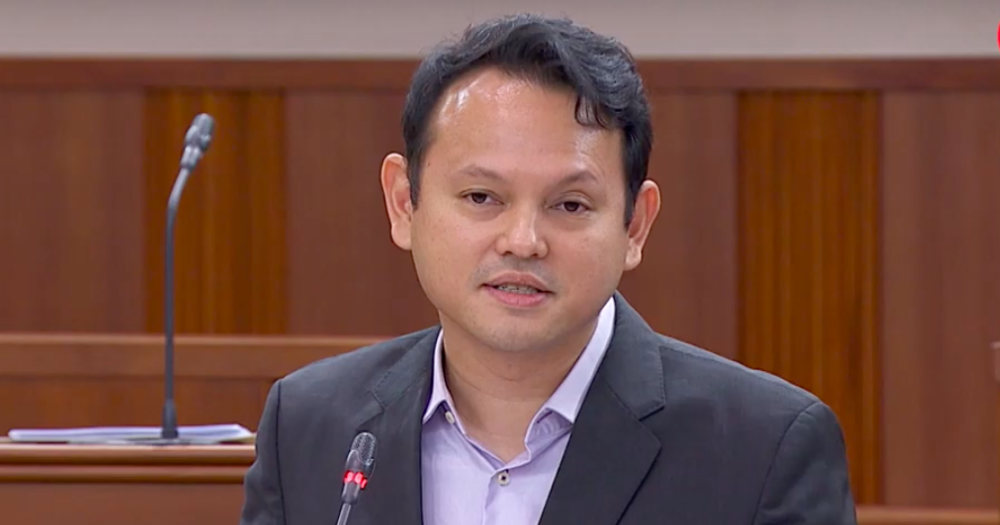Requiring employers of foreign workers to provide written employment contracts to their workers is not necessary, since the necessary information is already available in a written form, said Minister of State for Manpower and National Development Zaqy Mohamad in Parliament on Tuesday, Feb. 4.
Said necessary information can be found in foreign workers' key employment terms (KETs) and In-Principle Approval (IPA) letters, he said.
Zaqy was responding to Nominated Member of Parliament (NMP) Walter Theseira, who asked why written contracts are not mandatory for workers covered under the Employment of Foreign Manpower Act.
He also asked whether the government has plans to make such contracts mandatory.
Employers required to issue key employment "terms"
Under the Employment Act, said Zaqy, employers must provide key employment terms to their employees within 14 days from the start of employment.
These key employment terms include the workers' job title, main duties and responsibilities, place of work, work arrangements, salary details, leave entitlements, medical benefits, probation, and notice period.
Employers are able to issue these key employment terms in the form of an employment contract or an employment handbook, added Zaqy.
However, while the Ministry of Manpower (MOM) encourages employers of foreign domestic workers to issue key employment terms to their domestic helpers, they are not required to do so since foreign domestic workers are not covered by the Employment Act.
Foreign workers provided with IPA letters
For work permit holders, Zaqy said, employers must also ensure that their workers receive a copy of their In-Principle Approval letters prior to their departure to Singapore.
In-Principle Approval letters include key information such as occupation, basic monthly salary, fixed monthly allowances, as well as deductions.
The In-Principle Approval letter requirement is meant to ensure that foreign workers are notified of the most critical terms of their employment prior to departing from their home countries, said Zaqy.
He stated that employers are not allowed to decrease their workers' salary from the salary information listed in the In-Principle Approval letter, unless they obtain written agreement from the worker and notify MOM.
Thus, the key employment terms and In-Principle Approval letters that employers are required to provide their workers already provide "sufficient clarity" to foreign workers on the details of their employment.
There is "no further advantage" to be gained, then, by requiring that employers provide written employment contracts for their foreign workers, he said.
In fact, he added, requiring written contracts could create the unintended outcome of a foreign worker losing whatever protection he would be entitled to under the law if for some reason a written contract was not issued and thus there would be no employment relationship at all.
Power imbalance between workers and employers
Both Theseira and Member of Parliament (MP) Louis Ng brought up the issue of the power imbalance between foreign workers and employers.
"With the imbalance of power between the foreign workers and the employer, it's possible to push them into doing things which are maybe even illegal or prohibited because they're not aware of their rights and they can't enforce them effectively, even with these written contracts in place," said Theseira.
Ng gave an example of a situation that a migrant worker might find himself in, and expressed his hope that the government can "close that loophole":
"So you're offered a salary and then [it is] in the IPA, and you come to Singapore already, having paid all your deposits as well back in your home country.
And the employer then says, 'I'm going to reduce your salary. Take it or you go back home.'
Very likely they will take it, and very likely they will not dare to report to MOM."
Zaqy stated that the "check and balance" in place to prevent employers from reducing workers' salaries indiscriminately is that employers must come to an agreement with the employee and must notify MOM before doing so.
He also added that foreign workers can report any concerns to MOM, who will investigate if there are any deductions that were not previously agreed upon.
"We [MOM] do, from time to time, enforce against employment agencies as well as employers who do not comply", said Zaqy.
Settling-in programme
Zaqy pointed to Settling-in Programmes (SIPs) for both foreign domestic workers and foreign workers as another form of "check and balance" to help workers understand their rights and learn how to settle in better in Singapore.
These SIPs give the workers a chance to interact not only with the trainers and facilitators, said Zaqy, but also with NGOs such as Migrant Workers' Centre (MWC), who help to conduct the SIP.
As part of the Settling-In-Programme process, checks are conducted to make sure that the workers have their IPAs in hand when they arrive.
He said that a 2015 survey of foreign domestic workers conducted by MOM found that 94 per cent of foreign domestic workers indicated that they had signed an employment contract with their employers.
From recent checks of the Settling-In-Programme between August and December 2019, MOM found that 98 per cent of foreign workers, and almost all foreign domestic workers, had the complete set of In-Principle Approval letters with them before coming to Singapore.
So technically, said Zaqy, the workers already had a written contract.
Still, he recognised that despite the progress, there is still a remainder of workers who do not have their complete In-Principle Approval letters when coming to Singapore, and said that it is the government "can certainly work on".
He said that expanding and improving on the Settling-In-Programmes is a mechanism for the government to do this work.
Top image via YouTube / govsingapore.
If you like what you read, follow us on Facebook, Instagram, Twitter and Telegram to get the latest updates.
